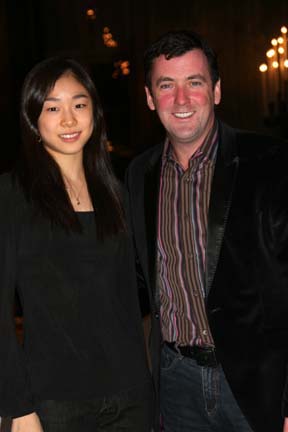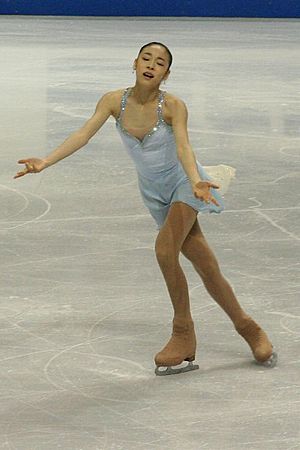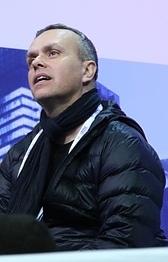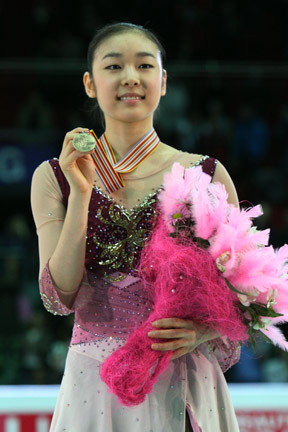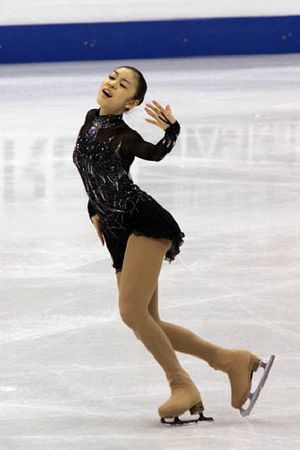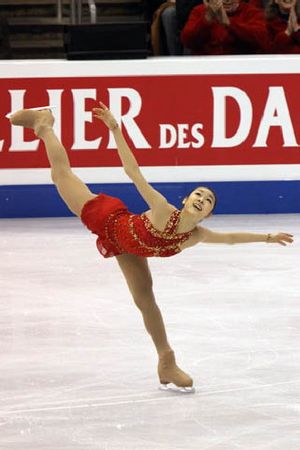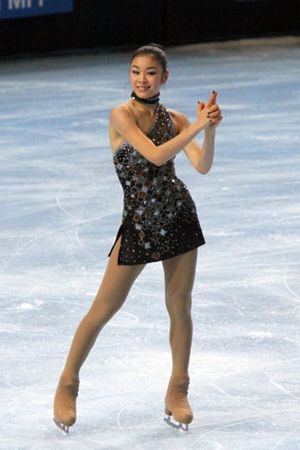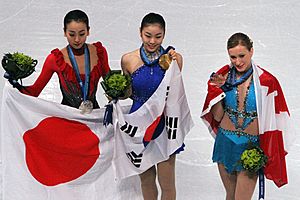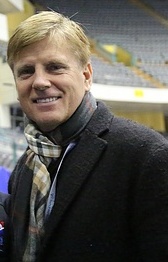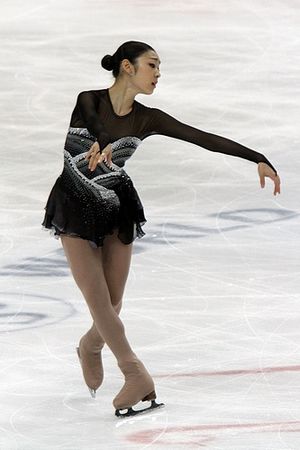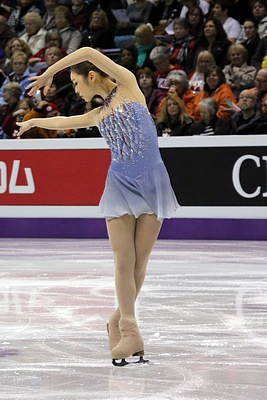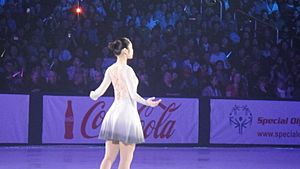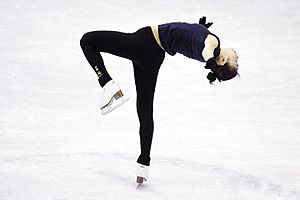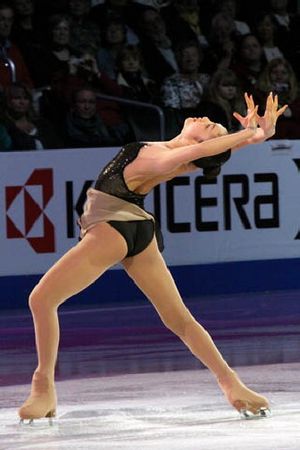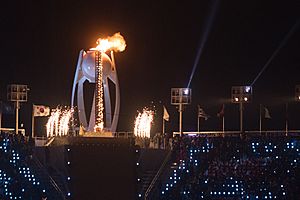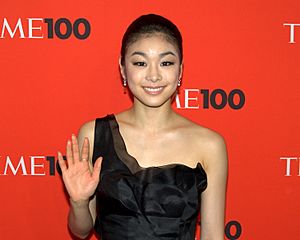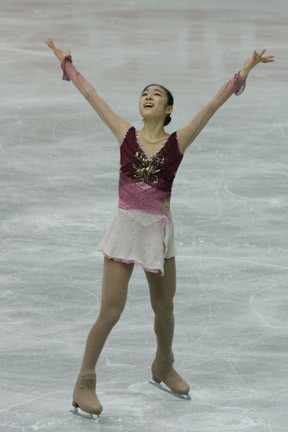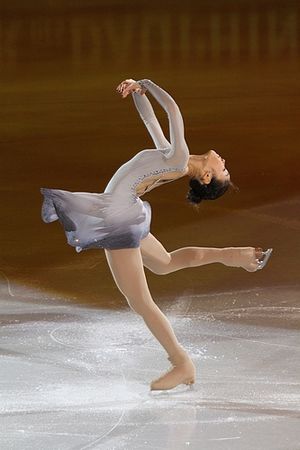Yuna Kim facts for kids
Quick facts for kids
Yuna Kim
|
|||||||||
|---|---|---|---|---|---|---|---|---|---|
| 김연아 | |||||||||
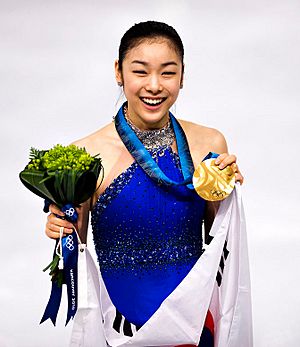
Kim at the 2010 Winter Olympics
|
|||||||||
| Born | September 5, 1990 Bucheon, South Korea
|
||||||||
| Other names | Kim Yeon-a, Kim Yuna | ||||||||
| Alma mater | Korea University (BA) | ||||||||
| Occupation | |||||||||
| Height | 1.64 m (5 ft 5 in) | ||||||||
| Spouse(s) |
Ko Woo-rim
(m. 2022) |
||||||||
| Awards |
|
||||||||
|
|||||||||
| Korean name | |||||||||
| Hangul |
김연아
|
||||||||
| Hanja |
金姸兒
|
||||||||
| Revised Romanization | Gim Yeona | ||||||||
| McCune–Reischauer | Kim Yŏna | ||||||||
Yuna Kim (Korean: 김연아), born on September 5, 1990, is a famous South Korean figure skater. She is also known as Kim Yuna or Kim Yeon-a. People often call her "Queen Yuna" because she is one of the greatest figure skaters ever.
Yuna Kim started skating when she was five years old. She competed in women's singles from 2001 to 2014. She won the 2010 Olympic gold medal and the 2014 Olympic silver medal. She also won two World titles (2009, 2013). She was the 2009 Four Continents champion and a three-time Grand Prix Final champion. As a junior, she won the 2006 World Junior title and the 2005 Junior Grand Prix Final. She was also a six-time South Korean national champion.
Yuna Kim always won a medal in her competitive career. She was the first South Korean skater to win medals at the Olympic Games, World Championships, ISU Grand Prix, and ISU Junior Grand Prix. She won every major international competition she entered. She even held world records 11 times! She was the first woman to score over 150 points in the free skating and over 200 points in the total score. Yuna Kim had a famous rivalry with Japanese skater Mao Asada.
After she stopped competing in 2014, Yuna Kim helped her home country, South Korea, win the bid to host the 2018 Winter Olympics in Pyeongchang. She also had a successful career in professional skating, performing in many ice shows like All That Skate. She was one of the highest-paid athletes in South Korea, even after retiring. Time magazine named her one of the World's 100 Most Influential People in 2010.
Contents
- Yuna Kim: Figure Skating Queen
- Competitive Highlights
- Detailed Results
- See also
Yuna Kim: Figure Skating Queen
Early Life and Skating Start
Yuna Kim was born on September 5, 1990, in Gyeonggi Province, South Korea. Her parents are Kim Hyeon-seok and Park Mi-hee. She has an older sister. Her mother was very involved in Yuna's skating career. She drove Yuna to the rink every day and helped her with practices. Yuna's family sometimes had trouble paying for her skating lessons. They even used their house as a guarantee for a bank loan. Yuna started skating at age five with her sister.
Yuna's father preferred to watch her skate on TV. Both her parents attended the 2010 Vancouver Olympics. Yuna said her parents helped her become a successful skater. She looked up to U.S. skater Michelle Kwan.
Her name is correctly spelled "Kim Yeon-a" in Korean. But when she got her passport, it was written as "Yu-na" by mistake. She prefers to be called "Yuna Kim".
Ryu Jong-hyun, a former ice dancer, coached Yuna from age 7 to 10. Shin Hea-sook, who competed in the 1980 Olympics, coached her from age 10 to 12. Yuna said both coaches helped her a lot. They noticed her talent early on. Ryu suggested Yuna get formal training. Yuna said she was "born with a good instrument" for skating. Ryu praised Yuna's hard work and dedication. By age 10, she landed her first triple toe loop. Two years later, she could land almost every triple jump cleanly. She had many injuries during middle school, including a pelvic muscle injury.
Amazing Junior Skating Career
First International Wins
In 2002, Yuna competed internationally for the first time at the Triglav Trophy in Slovenia. She won the gold medal in the novice competition. This was the first international win for a Korean woman. A year later, at age 12, she won the senior title at the South Korean Championships. She was the youngest skater ever to do this. She also won the 2003 Golden Bear of Zagreb. Yuna won three South Korean championships in a row from 2003 to 2006.
Junior Skating Debut
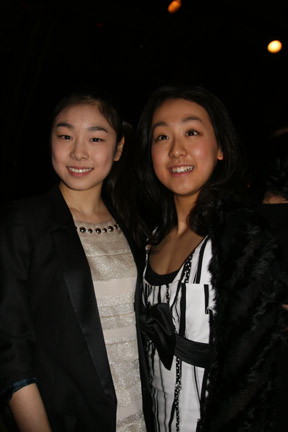
In the 2004–05 season, Yuna competed as a junior in the ISU Junior Grand Prix. She won a gold medal at the 2004 JGP Hungary. This was her first international competition and the first Junior Grand Prix win for a Korean skater. She scored 148.55 points. At her second event, the 2004 JGP China, she finished second. She then qualified for the 2004–05 Junior Grand Prix Final, where she won a silver medal. This was the first time a Korean skater won a medal at this event.
At the 2005 South Korean Championships, she won her third gold medal. She landed a triple-triple jump combination for the first time. She won a silver medal at the 2005 World Junior Championships. She came from sixth place in the short program to second overall. This was the first time a Korean skater won a medal at the Junior World Championships.
World Junior Champion
Yuna faced money problems because she didn't have enough sponsors. The Korea Skating Union promised to help pay for her training outside the country. She was too young for the 2006 Olympics. Instead, she took part in the Olympic torch relay. She won both her competitions in the 2005–06 Junior Grand Prix. At the 2005–06 Junior Grand Prix Final, she was the youngest skater. She won the gold medal with 174.12 points.
At the 2006 South Korean Championships, Yuna won first place. At the 2006 World Junior Championships, she became the first Korean skater to win the gold medal. She scored 177.54 points. She overcame an ankle injury to win. This was her eighth straight competition finishing in first or second place. It made people excited about Korea's chances at the 2010 Winter Olympics.
Becoming a Senior Skating Star
Senior Debut and First World Medal
For her senior debut in 2006–07, Yuna started training with Brian Orser in Toronto, Canada. She had been thinking of quitting because of injuries. After three months, she decided to stay in Toronto. Orser was her first main student.
Yuna made her senior international debut at the 2006 Skate Canada International. She won a bronze medal, becoming the first Korean skater to medal at a senior Grand Prix event. At the 2006 Trophée Éric Bompard, she became the first Korean skater to win a senior Grand Prix competition.
Her performances qualified her for her first Grand Prix Final. She won the event, becoming the first Korean skater to win a Grand Prix final. She beat silver medalist Mao Asada. Yuna later said she was surprised and happy to compete with strong Japanese skaters.
Yuna had to withdraw from the 2007 South Korean Championships due to a back injury. She also withdrew from the 2007 Asian Winter Games.
Yuna competed at the 2007 World Championships in Tokyo. Even with back pain, she won the short program with a record score of 71.95 points. She finished third overall, winning a bronze medal. She learned a lot from her first senior season.
More World Medals
For the 2007–08 season, Orser built a team for Yuna. This included spin coach Astrid Jansen and skating quality coach Tracy Wilson. David Wilson became her full-time choreographer. They worked on her triple loop jump. Yuna found training in Toronto a good escape from her huge fame in Korea.
Yuna started the season by winning the 2007 Cup of China. She was the first Korean skater to do so. She won the free skate with no deductions. She then won a gold medal at the 2007 Cup of Russia. She set a world record for the free skate score.
Yuna qualified for the 2007–08 Grand Prix Final in Italy. She won her second Grand Prix Final title in a row. She was the youngest skater to do this.
Yuna did not have to compete in the 2008 South Korean Championships. She had a hip injury, which kept her from the Four Continents Championships. Even with pain, Yuna competed at the World Championships in Sweden. She won her second bronze medal at the World Championships. She took two months to rest and recover.
First World Title
For the 2008–09 Grand Prix season, Yuna felt healthy. She had a new physical therapist and trainer. Her goal was to stay healthy. Her coaches decided she should have more say in her program music.
Yuna chose "Danse Macabre" for her short program. For her free skate, she chose "Scheherazade". She won the short program at Skate America. She won the gold medal overall. She landed six triple jumps in her free skate.
Yuna also won the 2008 Cup of China. She made some errors in her short program but showed "iron will" in her free skate. She returned to Toronto to rest and improve her programs.
Yuna qualified for the 2008 Grand Prix Final in South Korea. She felt a lot of pressure. She won the silver medal. She landed a beautiful triple flip-triple toe loop combination jump.
Yuna then competed at the 2009 Four Continents Championships in Canada. She set a new world record in the short program with 72.24 points. She won the gold medal with 189.07 points overall.
At the 2009 World Championships in Los Angeles, Yuna set another world record in the short program with 76.12 points. Her coach, Brian Orser, said it was a moment people would always remember. She won the free skate and set a new world record total score of 207.71 points. She became the first female skater to score over 200 points. She won her first World Championship title. She performed an "elegant, effortless routine". She landed five triple jumps. The audience gave her a standing ovation. Yuna said winning was a dream come true.
Road to the Olympics
Yuna's goal for the 2009–10 season was to improve her programs and expression. She competed at the 2009 Trophée Éric Bompard and the 2009 Skate America. At the Trophée Éric Bompard, she won the short program with 76.08 points. She broke her own world records for both the free skate and the overall score.
At the 2009 Skate America, Yuna again placed first in the short program with 76.28 points. She set a new world record for the short program. Yuna said every competition was important practice for the Olympics. She won the event overall.
Yuna qualified for the 2009–10 Grand Prix Final in Japan. She won the free skate and her third Grand Prix Final title. In December, she carried the Olympic torch for the second time.
In March 2010, Yuna competed at the 2010 World Championships in Italy. She found it hard to find motivation after winning the Olympics. She placed seventh in the short program but won the free skate. She won the silver medal overall. Yuna admitted that Worlds were mentally difficult for her.
Olympic Gold and World Titles
Vancouver Olympic Gold
In February 2010, Yuna competed in the women's event at the 2010 Winter Olympic Games in Vancouver, Canada. She was a strong favorite to win. She felt a lot of pressure but was "prepared for anything". She stayed in a hotel with her mother and coaches instead of the Olympic Village.
In the short program, Yuna performed perfectly. She scored 78.50 points, breaking her own world record. She felt no pressure for the free skate. On February 25, Yuna won the free skate with an amazing performance, scoring 150.06 points. This was a new world record for the free skate. Overall, Yuna scored 228.56 points, breaking her own record again. She won the gold medal, becoming the first South Korean skater to win an Olympic medal in figure skating. She beat silver medalist Mao Asada by a huge margin of 23.06 points.
Yuna's scores at the 2010 Olympics were the highest ever under the ISU Judging System. They were even listed in the Guinness World Records. Dorothy Hamill, the 1976 Olympic champion, called Yuna's performance "jaw-dropping magnificence". Jacques Rogge, then-president of the International Olympic Committee, said Yuna's performance "touched me". U.S. Secretary of State Hillary Clinton also praised Yuna's performance. In South Korea, the stock market paused during her performances. Yuna met with the South Korean president after the Olympics.
Coaching Changes and Break
In August 2010, Yuna and Brian Orser stopped working together. Orser said he was surprised. Yuna continued to train without a coach at first. In October, she hired Peter Oppegard and continued working with David Wilson as her choreographer.
Yuna chose not to compete in the Grand Prix series in 2010–11. She wanted to focus on the 2011 World Championships in Moscow. This was her first competition in over a year. She wanted to enjoy it and show a different side of herself.
At the World Championships, Yuna placed first in the short program. She won the silver medal overall. She continued her impressive record of winning a medal in every competition since 2005.
Yuna announced she would take a break from skating for the entire 2011–12 season. She said she needed the break due to the high expectations and pressure she felt.
Second World Title
In July 2012, Yuna announced she would return to competitive skating. Her goal was to compete at the 2014 Winter Olympics in Sochi. She felt less pressure this time. She found inspiration from younger Korean skaters. Yuna was not invited to the Grand Prix circuit. So, she competed in smaller events to qualify for the 2013 World Championships.
Yuna left Oppegard and started training with her childhood coaches, Shin Hea-sook and Ryu Jong-hyun. They worked on her stamina. Yuna chose music from "The Kiss of the Vampire" for her short program and "Les Misérables" for her free skate.
Yuna's first competition back was the 2012 NRW Trophy in Germany. She won the gold medal. Her short program score was the highest recorded that season, even though it was a minor competition. She easily qualified for the 2013 World Championships. She enjoyed training at home in Korea again.
Yuna won her fifth national title at the 2013 South Korean Championships. She skated a perfect short program and free skate.
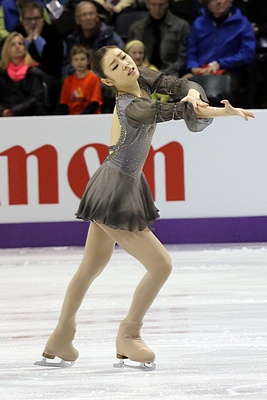
At the 2013 World Championships, Yuna aimed for her second World title. She placed first in the short program. She won the free skate with a perfect program, scoring 148.34 points. With 218.31 points overall, Yuna won her second world title. She beat other competitors by a large margin. She received a standing ovation. Yuna said she enjoyed skating and competing more now. She had won medals in all 30 of her international competitions.
Sochi Olympic Silver and Retirement
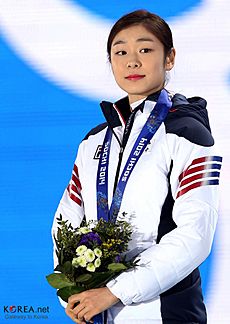
For the 2013–14 ISU Grand Prix season, Yuna had to withdraw due to a foot injury.
Yuna competed in the 2013 Golden Spin of Zagreb, her first competition in nine months. She won both the short program and free skate. Her overall score was one of her best.
In January 2014, Yuna competed in the 2014 South Korean Championships. She won her sixth national title with a very high score.
In February 2014, Yuna competed at the 2014 Winter Olympic Games. She hoped to win back-to-back Olympic gold medals. She wanted to finish her career without regrets. She placed first in the short program. She skated last in the free skate. Her overall score earned her the silver medal. There was some controversy about the judging, but Yuna chose not to comment.
In 2023, the Korean Sport & Olympic Committee asked the International Olympic Committee to re-investigate the results. This was after another skater admitted to failing a doping test. But the IOC refused. As planned, Yuna announced that the 2014 Olympics would be her last competition.
Professional Skating Career
Yuna performed in ice shows in South Korea and Japan. From 2008 to 2010, she was in "Festa on Ice". In 2008, she hosted a charity ice show called "Angels on Ice". In 2009, she headlined "Ice All Stars" in Seoul.
In April 2010, Yuna started her own management company, All That Sports Corporation (AT Sports), with her mother. They organized an ice show called All That Skate. In October 2010, AT Sports launched "All That Skate LA" in the U.S. The show was very popular and received good reviews.
In 2012, Yuna took part in "Artistry on Ice" in China. After retiring in 2014, she held farewell ice shows in Seoul. In 2018, she made a special appearance in an "All That Skate" show. She skated for the first time in four years. She performed to "House of Woodcock" and mentored younger skaters. She didn't do any jumps but wanted a "pure and beautiful" program. She impressed the crowd with her signature moves. In 2018, she also appeared in the Spanish ice show "Revolution on Ice". She donated her fee to UNICEF. In 2019, Yuna performed in "All That Skate" again.
Yuna said that tickets to her shows sold out very quickly. Other skaters enjoyed performing in her shows because of the enthusiastic audiences.
Yuna Kim's Skating Style
Yuna Kim was known for her graceful movements, powerful jumps, and speed. Michelle Kwan said Yuna was what judges looked for in jump quality, spin quality, and edges. She was famous for her Ina Bauer, her triple Lutz-triple toe loop combination, and her "Yuna Camel" spin. In 2009, the Associated Press praised her ease, lightness, speed, and strong landings. Scott Hamilton said Yuna was the best example of how to earn high scores.
When Yuna was younger, South Korea had limited skating facilities. Her parents were her main financial support. Her early coaches said her injuries were "almost routine". In 2006, moving to Toronto to work with David Wilson and Brian Orser was a turning point. Her team helped her with presentation and injury prevention. Orser said Yuna had a more "normal life" in Toronto away from her huge fame in South Korea.
Yuna liked to be "perfectly prepared" for her performances. She believed this helped her skate better.
Many people said Yuna had "no rival in terms of artistry". Music was very important to her skating. She was highly praised for her skating and presentation skills. Philip Hersh said Yuna perfectly balanced being an athlete and an artist. Frank Carroll said Yuna could combine athletics and creativity, which was very hard under the new judging system.
Working with David Wilson
David Wilson started working with Yuna as her choreographer in 2006. He choreographed all her competitive programs from 2007–08 until her retirement in 2014. Wilson said it was hard to connect with her at first because she showed little emotion and spoke little English. He spent months helping her smile and laugh. Yuna eventually relaxed and learned to use facial expressions. Wilson praised Yuna's strong work ethic and integrity.
Her Impact on Figure Skating
Yuna's success made figure skating very popular in South Korea. She was called "Queen Yuna". Philip Hersh said no other skater was as celebrated as Yuna in her country. Her former coach, Chi Hyun-jung, said Yuna's success changed skating in South Korea. Brian Orser said Yuna's performances at the 2010 Olympics were among the greatest ever. She inspired thousands of South Korean girls to start figure skating. International Figure Skating magazine said Yuna was the boost figure skating needed. In 2010, Forbes magazine listed her as one of the highest-paid athletes.
Yuna and Japanese skater Mao Asada were famous rivals since their junior years. Their rivalry was called "the best thing going in skating".
Awards and Special Roles
Yuna Kim has received many awards and honors. A major Korean newspaper named her Korea's "person of the year" in 2008 and 2009. Gallup polls named her South Korea's top athlete before the 2010 Olympics. In August 2010, the city of Los Angeles named August 7 "Yu-Na Kim Day".
Yuna was appointed a public relations ambassador for South Korea's bid to host the 2014 Olympics. In 2010, she helped promote their bid for the 2018 Olympics. She was credited with helping Korea win the bid. In October 2011, Yuna was named an official ambassador for the 2018 Olympics. She was the final torch bearer and lit the Olympic flame at the Opening Ceremony. In 2022, she was named honorary ambassador for the 2024 Winter Youth Olympics.
Personal Life and Education
Yuna went to Dojang Middle School and Suri High School. She graduated from Korea University in 2013 with a degree in Physical Education. She chose this university because it understood athletes' needs.
Yuna and her mother became Roman Catholics in 2008. Her confirmation name is Stella. In 2014, the National Catholic Register said she was an example of living her faith publicly. She would pray on the ice and make the sign of the cross. She also made donations and volunteered at Catholic organizations.
By 2020, Yuna was very private about her personal life. On July 25, 2022, it was confirmed that Yuna would marry singer Ko Woo-rim of Forestella. They met at the 2018 "All That Skate" show. They married on October 22, 2022, in Seoul.
Records and Big Wins
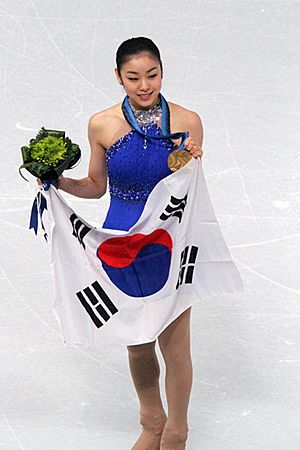
- She used to hold the world record for the women's total score, short program score, and free skate score.
- First Korean female skater to win an international event (2002).
- First Korean female skater to win a Junior Grand Prix event (2004).
- First Korean skater to win a Junior Grand Prix Final (2005) and World Junior Championships (2006).
- First Korean skater to win a Senior Grand Prix event (2006) and Grand Prix Final (2006).
- She never finished off the podium (always won a medal) in her entire career.
- Youngest skater to win two Grand Prix Finals in a row (2006, 2007).
- First Korean skater to win a World Championship medal (2007).
- First Korean skater to win the Winter Olympics (2010).
- First female skater to win the Grand Prix Final, Four Continents Championships, World Championships, and Winter Olympic Games.
- First figure skater to win all major ISU championship titles (Junior Grand Prix Final, World Junior Championships, Grand Prix Final, Four Continents Championships, World Championships, and Winter Olympic Games).
- First female skater to score over 200 points (2009 World Championships) and 220 points (2010 Winter Olympics) in total.
- First female skater to score over 150 points in the free skate (2010 Winter Olympics).
World Record Scores
Yuna Kim broke world records 13 times in her career.
- J – Junior world record
| Date | Score | Segment | Event | Notes |
|---|---|---|---|---|
| Sep 4, 2004 | 101.32 | Free skating (J) | 2004 JGP Budapest | The record was broken by Mao Asada on December 5, 2004. |
| Mar 11, 2006 | 60.86 | Short program (J) | 2006 World Junior Championships | The record was broken by Caroline Zhang on March 1, 2008. |
| Mar 23, 2007 | 71.95 | Short program | 2007 World Championships | |
| Nov 24, 2007 | 133.70 | Free skating | 2007 Cup of Russia | |
| Feb 4, 2009 | 72.24 | Short program | 2009 Four Continents Championships | |
| Mar 27, 2009 | 76.12 | Short program | 2009 World Championships | |
| Mar 28, 2009 | 207.71 | Combined total | Kim became the first woman to score above 200 points. | |
| Oct 17, 2009 | 133.95 | Free skating | 2009 Trophée Éric Bompard | |
| Oct 17, 2009 | 210.03 | Combined total | ||
| Nov 14, 2009 | 76.28 | Short program | 2009 Skate America | |
| Feb 23, 2010 | 78.50 | Short program | 2010 Winter Olympics | The record was broken by Mao Asada on March 27, 2014. |
| Feb 25, 2010 | 150.06 | Free skating | Kim became the first woman to score above 150 points in free skating. The record was broken by Evgenia Medvedeva on April 2, 2016. | |
| Feb 25, 2010 | 228.56 | Combined total | Kim became the first woman to score above 220 points. The record was broken by Evgenia Medvedeva on January 27, 2017. |
Skating Programs
Programs as a Competitive Skater
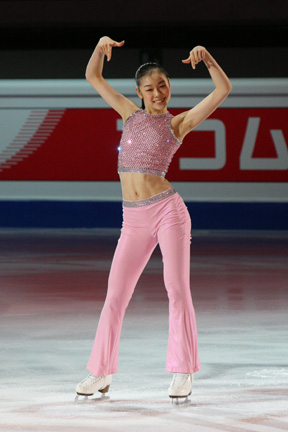
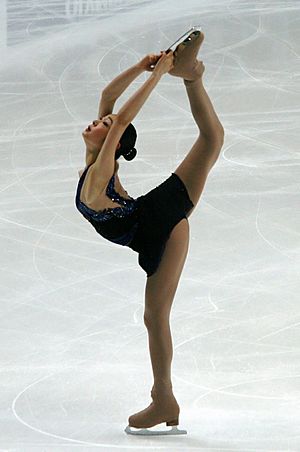
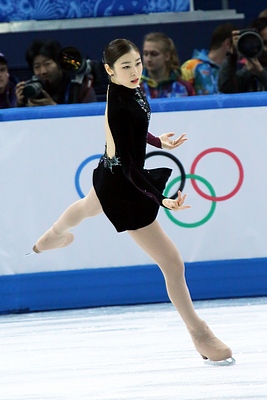
- Programs performed at the Winter Olympics are in bold.
| Season | Short program | Free skate program | Exhibition program |
|---|---|---|---|
| 2001–02 |
|
|
N/A |
| 2002–03 | Can-can |
Carmen Fantasy
|
N/A |
| 2003–04 |
"Snowstorm"
|
Carmen Fantasy | N/A |
| 2004–05 | "Snowstorm" |
"Papa, Can You Hear Me?"
|
"Ben"
|
| 2005–06 |
"El Tango de Roxanne"
|
"Papa, Can You Hear Me?" |
"One Day I'll Fly Away"
|
| 2006–07 | "El Tango de Roxanne" |
The Lark Ascending
|
|
| 2007–08 |
|
Miss Saigon
|
"Only Hope"
|
|
"Once Upon a Dream"
|
|||
|
"Just a Girl"
|
|||
| 2008–09 |
Danse Macabre
|
|
"Only Hope" |
|
"Gold"
|
|||
| 2009–10 |
James Bond
|
Concerto in F
|
"Méditation"
|
|
"Don't Stop the Music"
|
|||
| 2010–11 |
|
Homage to Korea
(incl. "Arirang", 아리랑)
|
"Bulletproof"
|
| 2011–12 | N/A | N/A |
"Fever"
|
| 2012–13 |
The Kiss of the Vampire
|
|
"El Tango de Roxanne" |
|
"Someone Like You"
|
|||
|
|||
| 2013–14 |
"Send in the Clowns"
|
Adiós Nonino
|
"Nessun dorma"
|
|
"Imagine"
|
Programs as a Professional Skater
| Year | Program | Event |
|---|---|---|
| 2014 |
"Send In the Clowns"
|
All That Skate |
|
"Nessun Dorma"
|
||
| 2018 |
"House of Woodcock"
|
All That Skate |
|
"House of Woodcock"
|
Revolution on Ice | |
|
"All of Me"
|
||
|
Charlie Chaplin medley
|
||
| 2019 |
Variations on "Dark Eyes"
|
All That Skate |
|
"Issues"
|
Competitive Highlights
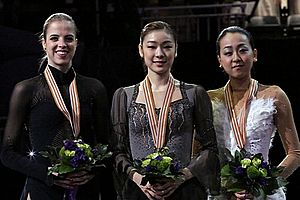
- GP – Event of the ISU Grand Prix Series
- JGP – Event of the ISU Junior Grand Prix Series
| Season | 2006–07 | 2007–08 | 2008–09 | 2009–10 | 2010–11 | 2012–13 | 2013–14 |
|---|---|---|---|---|---|---|---|
| Winter Olympics | 1st | 2nd | |||||
| World Championships | 3rd | 3rd | 1st | 2nd | 2nd | 1st | |
| Four Continents Championships | 1st | ||||||
| Grand Prix Final | 1st | 1st | 2nd | 1st | |||
| South Korean Championships | 1st | 1st | |||||
| GP Cup of China | 1st | 1st | |||||
| GP Cup of Russia | 1st | ||||||
| GP Skate America | 1st | 1st | |||||
| GP Skate Canada | 3rd | ||||||
| GP Trophée Éric Bompard | 1st | 1st | |||||
| Golden Spin of Zagreb | 1st | ||||||
| NRW Trophy | 1st |
| Season | 2001–02 | 2002–03 | 2003–04 | 2004–05 | 2005–06 |
|---|---|---|---|---|---|
| World Junior Championships | 2nd | 1st | |||
| Junior Grand Prix Final | 2nd | 1st | |||
| South Korean Championships | 1st J | 1st S | 1st S | 1st S | 1st S |
| JGP Bulgaria | 1st | ||||
| JGP China | 2nd | ||||
| JGP Hungary | 1st | ||||
| JGP Slovakia | 1st |
Detailed Results
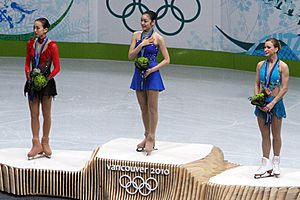
| Segment | Type | Score | Event |
|---|---|---|---|
| Total | TSS | 228.56 | 2010 Winter Olympics |
| Short program | TSS | 78.50 | 2010 Winter Olympics |
| TES | 44.70 | 2010 Winter Olympics | |
| PCS | 35.89 | 2014 Winter Olympics | |
| Free skating | TSS | 150.06 | 2010 Winter Olympics |
| TES | 78.30 | 2010 Winter Olympics | |
| PCS | 74.50 | 2014 Winter Olympics |
Senior Level
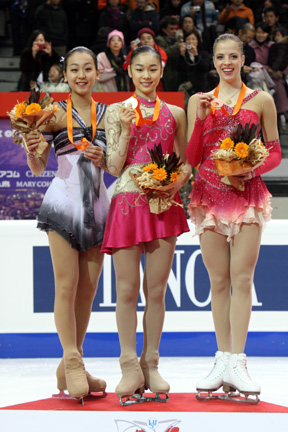
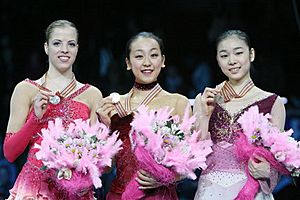
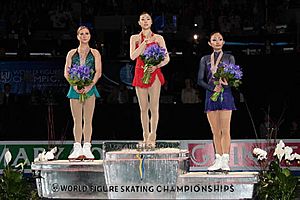
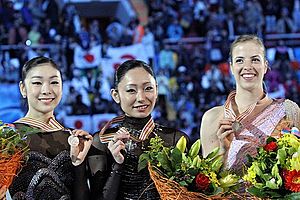

- Small medals for the short program and free skating are only given at ISU Championships.
| Date | Event | SP | FS | Total | |||
|---|---|---|---|---|---|---|---|
| P | Score | P | Score | P | Score | ||
| Apr 24 – May 1, 2011 | 1 | 65.91 | 2 | 128.59 | 2 | 194.50 | |
Junior Level
- The 2005 South Korean Championships used an old judging system.
See also
 In Spanish: Yuna Kim para niños
In Spanish: Yuna Kim para niños
 | Leon Lynch |
 | Milton P. Webster |
 | Ferdinand Smith |


